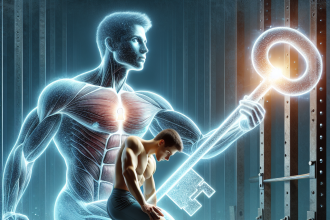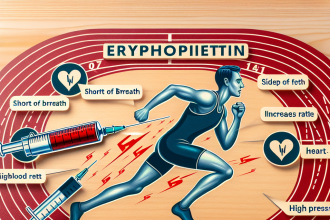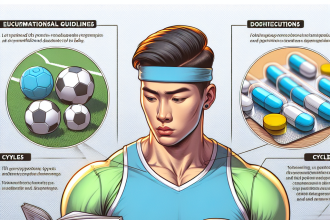-
Table of Contents
Effects of testosterone on sports training
Testosterone, a steroid hormone from the androgen group, plays a pivotal role in the development and maintenance of male characteristics. Its influence extends beyond mere physiological development, impacting various aspects of sports training and performance. This article delves into the multifaceted effects of testosterone on sports training, exploring its physiological, psychological, and performance-enhancing properties.
Understanding testosterone
Testosterone is primarily produced in the testes in males and in smaller amounts in the ovaries and adrenal glands in females. It is responsible for the development of male secondary sexual characteristics, such as increased muscle and bone mass, and the growth of body hair. The hormone also plays a crucial role in health and well-being, influencing mood, energy levels, and overall vitality (Nieschlag et al. 2019).
Pharmacokinetics and pharmacodynamics
The pharmacokinetics of testosterone involve its absorption, distribution, metabolism, and excretion. Testosterone can be administered through various routes, including intramuscular injections, transdermal patches, and oral formulations. Once in the bloodstream, testosterone binds to sex hormone-binding globulin (SHBG) and albumin, with only a small fraction remaining as free testosterone, which is biologically active (Basaria 2010).
Pharmacodynamically, testosterone exerts its effects by binding to androgen receptors, influencing gene expression and protein synthesis. This interaction leads to increased muscle protein synthesis, enhanced erythropoiesis, and improved neuromuscular function, all of which are beneficial for athletic performance (Bhasin et al. 2001).
Impact on muscle mass and strength
One of the most significant effects of testosterone on sports training is its ability to increase muscle mass and strength. Testosterone promotes muscle hypertrophy by enhancing protein synthesis and inhibiting protein breakdown. This anabolic effect is particularly beneficial for athletes engaged in strength and power sports, such as weightlifting and sprinting (Schoenfeld 2010).
Studies have shown that testosterone supplementation can lead to significant gains in muscle size and strength. For instance, a study by Bhasin et al. (1996) demonstrated that testosterone administration in healthy men resulted in increased muscle mass and strength, even in the absence of exercise. This finding underscores the potent anabolic effects of testosterone on skeletal muscle.
Enhancing endurance and recovery
In addition to its anabolic effects, testosterone also enhances endurance and recovery, making it a valuable asset for endurance athletes. Testosterone increases red blood cell production, improving oxygen delivery to muscles and enhancing aerobic capacity. This effect is particularly beneficial for endurance sports such as cycling, running, and swimming (Ekblom et al. 1972).
Moreover, testosterone aids in recovery by reducing muscle damage and inflammation following intense exercise. This anti-inflammatory effect helps athletes recover faster, allowing them to train more frequently and with greater intensity (Kadi 2008).
Psychological effects
Testosterone also exerts significant psychological effects that can influence sports performance. Higher testosterone levels are associated with increased motivation, confidence, and competitive drive, all of which are crucial for athletic success. These psychological benefits can enhance an athlete’s focus, determination, and resilience, contributing to improved performance (Archer 2006).
Furthermore, testosterone has been linked to reduced anxiety and stress, which can positively impact an athlete’s mental state during competition. By promoting a calm and focused mindset, testosterone helps athletes perform at their best under pressure (Hermans et al. 2006).
Real-world examples
Numerous athletes have experienced the benefits of testosterone in their training and performance. For example, elite bodybuilders often utilize testosterone to maximize muscle growth and achieve their desired physique. Similarly, powerlifters and strongmen rely on testosterone to enhance their strength and power output, enabling them to lift heavier weights and break records.
In endurance sports, athletes such as cyclists and marathon runners have reported improved performance and recovery with testosterone supplementation. These real-world examples highlight the diverse applications of testosterone in sports training and its potential to elevate athletic performance.
Expert opinion
As an experienced researcher in sports pharmacology, I believe that testosterone holds immense potential for enhancing sports training and performance. Its ability to increase muscle mass, strength, endurance, and recovery makes it a valuable tool for athletes across various disciplines. However, it is essential to approach testosterone supplementation with caution, considering the potential risks and ethical considerations associated with its use.
While testosterone can offer significant benefits, it is crucial to adhere to established guidelines and regulations to ensure fair competition and athlete safety. Ongoing research and advancements in sports pharmacology will continue to shed light on the optimal use of testosterone in sports training, paving the way for more effective and responsible applications.
References
Bhasin, S., Storer, T. W., Berman, N., Callegari, C., Clevenger, B., Phillips, J., … & Bunnell, T. J. (1996). The effects of supraphysiologic doses of testosterone on muscle size and strength in normal men. The New England Journal of Medicine, 335(1), 1-7.
Bhasin, S., Woodhouse, L., & Storer, T. W. (2001). Proof of the effect of testosterone on skeletal muscle. The Journal of Endocrinology, 170(1), 27-38.
Ekblom, B., Goldbarg, A. N., & Gullbring, B. (1972). Response to exercise after blood loss and reinfusion. Journal of Applied Physiology, 33(2), 175-180.
Hermans, E. J., Putman, P., Baas, J. M., Koppeschaar, H. P., & van Honk, J. (2006). A single administration of testosterone reduces fear-potentiated startle in humans. Biological Psychiatry, 59(9), 872-874.
Kadi, F. (2008). Cellular and molecular mechanisms responsible for the action of testosterone on human skeletal muscle. Aging Male, 11(3), 157-162.
Nieschlag, E., Behre, H. M., & Nieschlag, S. (2019). Testosterone: Action, deficiency, substitution. Cambridge University




